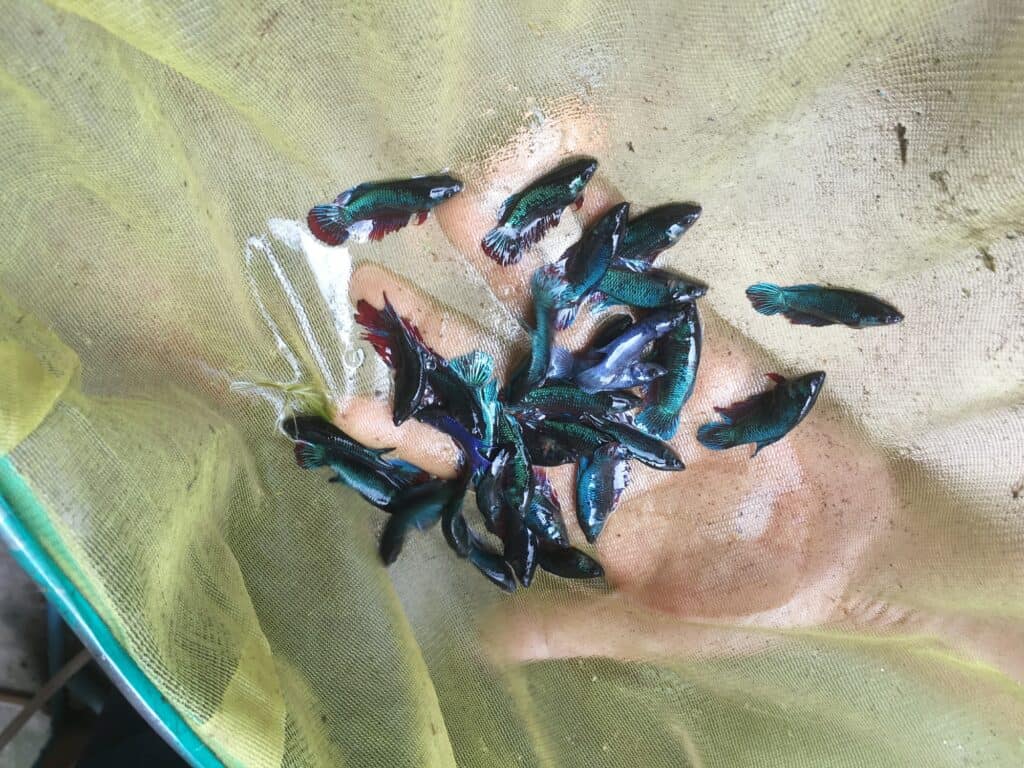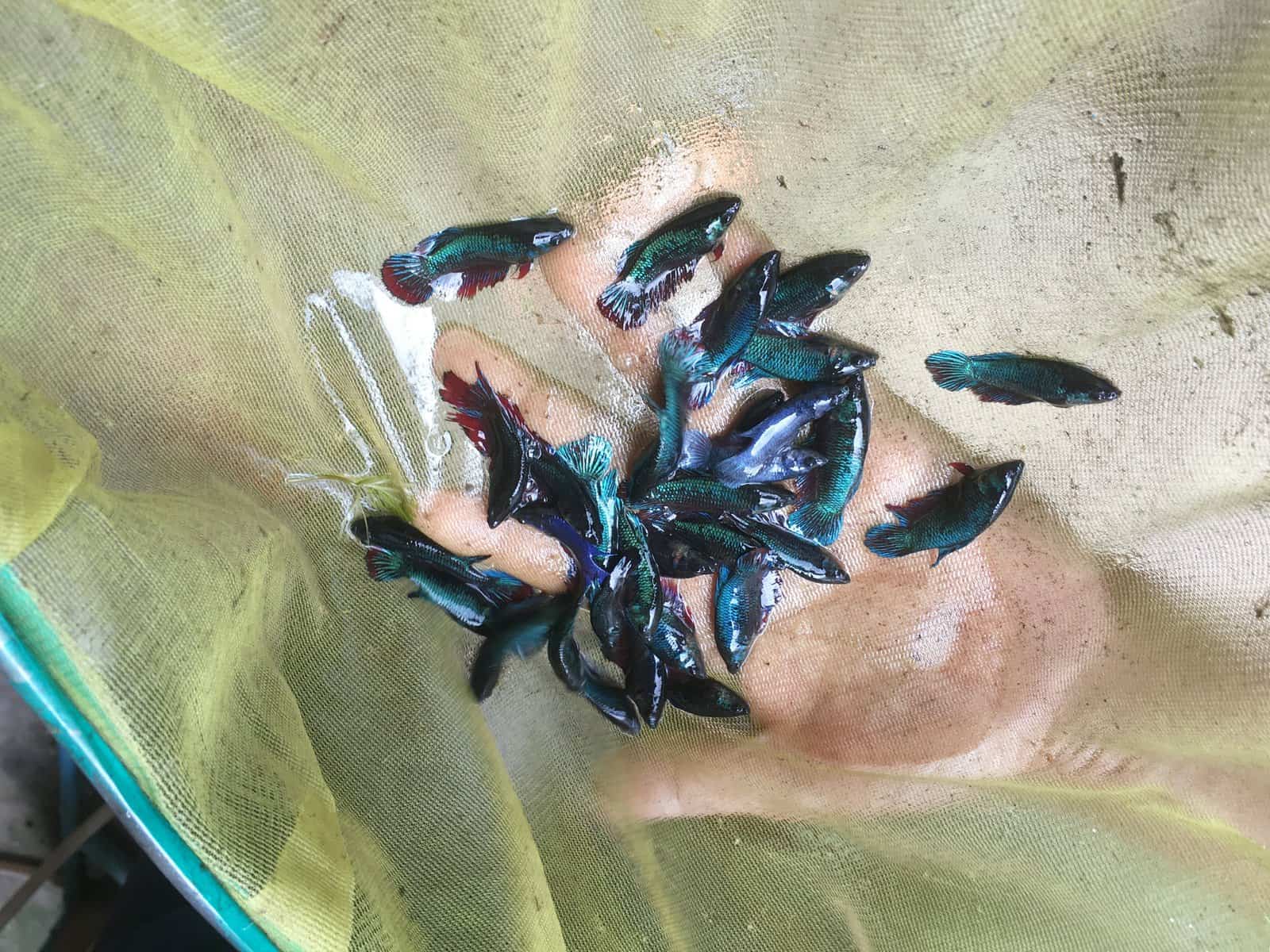If you’ve ever caught a frog in a mud puddle, you have some idea of how betta fish were first discovered. Betta-keeping began in Thailand when young children found the fish in rice paddies and took them home as pets.
Unfortunately, Thai people also liked to watch aggressive fish fight for sport, much like cockfighting. This is how betta fish got the name “Siamese fighting fish.”
Now, both cockfighting and betta fish fighting is illegal in most places, but wild bettas still live in rice paddies throughout Southeast Asia.
That being said, the betta fish we see in stores and keep as pets look very different than wild bettas in rice paddies due to years of selective breeding.
To learn more about the history of betta fish, please read our blog, “Fascinating Betta Fish Facts: Everything You Need To Know.”
Do Betta Fish Live in Rice Paddies?
Yes, in the wild, betta fish live in rice paddies, along with stagnant ponds, marshes, and slow-moving streams throughout Southeast Asia.
Where Do Pet Bettas Live?
Betta Fish Farms
Most pet bettas live on farms, where they are bred for special colors, fin shapes, and characteristics.
Farmers keep the fish in ponds to mirror their natural habitats, and the fish do not fight when they are young and accustomed to living together.
Listen to a betta fish farmer explain the process below:
Once the fish are separated, they become territorial and need to be kept in smaller containers. Still, the small jars you see betta fish in at the pet store are only meant to be temporary.
After purchasing a betta, you should place it in a 5-gallon tank (or an even larger tank) with warm, treated water and plenty of aquatic plants.
For help setting up your tank, check out our, “Quick and Easy Guide.”
Betta Breeders and Specialty Shops
Some pet bettas do not come from farms at all. Rather, betta breeders and hobbyists keep specialty shops where they breed, raise, and sell bettas to the general public and betta collectors.
If you are looking for a rare betta, you may need to do business with a specialty breeder rather than getting a fish from a betta fish farm.
You may also wish to purchase your betta from a breeder or specialty shop for ethical reasons. Betta farms often ship the fish to pet stores, and the conditions are terrible for the fish.
Buying from a small operation – or even directly from a reputable betta fish farm – can help ensure you are raising your betta as ethically as possible.
What Is the Natural Habitat for Betta Fish?
The natural habitat for betta fish is the warm, shallow freshwaters of Southeast Asia.
Many varieties of betta live in rice paddies or river basins in Thailand, Malaysia, Indonesia, Vietnam, Laos, and Cambodia, and some fish (like the betta mandor) live only in rainforests on the island of Borneo.
While bettas occupy small spaces in the wild, they need more room in captivity. In the wild, a betta fish might live in a puddle, but it can jump from puddle to puddle whenever it wants, thus expanding its habitat at will.
Because your betta will not have an entire wetland to roam, it’s important to give them plenty of space – at least five gallons of it (bigger is always better).
Another feature of the betta fish’s natural habitat is plenty of plant life. Betta fish in rice paddies swim among the roots of rice plants and have plenty of places to hide.
While they might nibble at the plants from time to time, their diet mainly consists of insects and other small organisms in the wild.
To recreate your betta’s natural habitat, fill your tank with living aquatic plants, including some that float at the top. Just make sure to leave plenty of room, so your betta can swim to the surface and use its labyrinth organ as needed.
Instead of feeding your betta fish pellets alone, introduce some live or flash frozen insects to their diet. Many bettas will go crazy for a mealworm or small cricket!
Water Temperature and Acidity
Different varieties of betta are accustomed to different water temperatures and pH levels. No matter what, do not just stick your betta fish in some tap water and call it a day.
Before introducing your betta to its new home, filter and treat the water. You may also need to use a heater to get the temperature just right.
In the wild, betta fish live in shallow water, so the sun keeps the water nice and warm. They also live among plants, which changes the acidity of the water.
Determine the water temperature and acidity of your tank by researching your betta’s natural habitat. A Half Moon betta from a farm in Thailand, for example, might need different conditions than a Betta mandor from the rainforests of Borneo.
Fortunately, there is a wealth of information on the internet, including right here on Betta Source. We have care guides for a number of different bettas – and even the aquatic plants you might keep in your tank!
From Rice Paddies to Your Bedroom
By keeping a pet betta fish, you are honoring a tradition that has been around since the 14th century A.D.
You may not be scooping your betta directly from a rice paddy, but you can do a lot to make sure your fishy friend feels at home.
To review:
- Buy your betta from a breeder, specialty shop, or directly from a reputable betta fish farm.
- Keep your betta fish in a 5-gallon tank (never a fish bowl or vase).
- Filter and pre-treat tap water before adding it to your betta’s tank.
- Include live, aquatic plants in your tank (have some floating plants but leave room at the top of the tank, so your betta can breathe).
- Feed your betta live or freeze-dried insects
- Do research about your chosen variety of betta and match the water temperature and acidity accordingly
A happy, healthy betta will provide you with hours of entertainment and years of companionship.
Now that you know a little bit about your fish’s background and how to mimic its natural habitat, we know you will enjoy its bright colors and famous feistiness.
If you need more resources for picking out and raising your very own betta, please check out:

